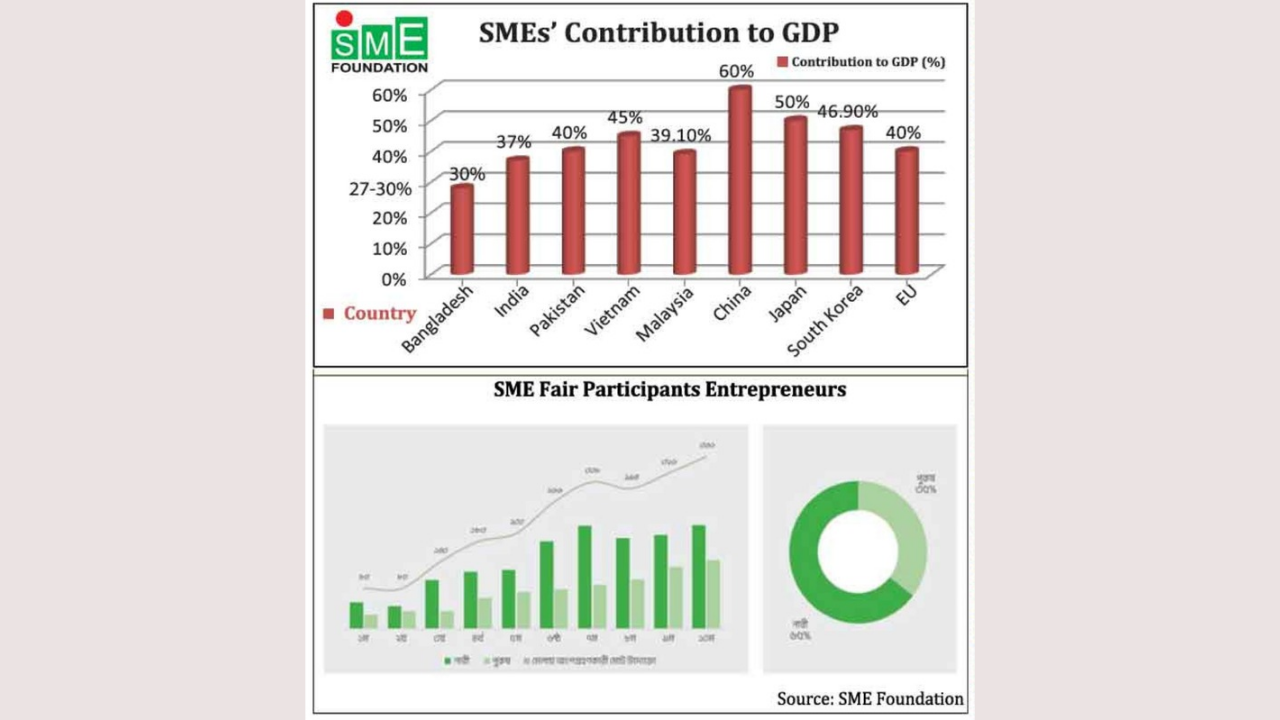

Niaz Mahmud
A vibrant small and medium enterprise (SME) sector is one of the principal driving forces in the development of the country's economy. This sector is considered the financial backbone due to the large number of entrepreneurs it produces.
This sector has made a contribution to the economy with the SME Foundation, focusing on policies and actions that assist SMEs to grow and become more competitive.
SME's contribution to gross domestic product (GDP) in Bangladesh is about 27%; it stands at 40% in Pakistan, 52% in Sri Lanka, 60% in China, and 37% in India. In most developed countries, the SME sector contributes over 50% of the GDP.
Small and medium enterprises are globally recognized for their intrinsic contribution to economic growth and creating employment opportunities. Both developed and developing countries comprehend that SMEs have become one of the key instruments to achieve sustainable economic growth, according to economists.
Md Rashedul Karim Munna, managing director of Creation Private, a leading manufacturer and exporter of jute products, said it is estimated that Bangladesh will become a trillion-dollar economy by 2040. SMEs can be a good tool in that case.
He also said that policymakers must realise that SMEs can also help the National Board of Revenue (NBR) expand their value-added tax and income tax net.
Kazi Sazedur Rahman is a successful entrepreneur. He owns KPC Industry, which manufactures paper cups. He also won the SME Foundation Best Entrepreneur Award. He told The Bangladesh Today that the SME sector is one of the foundations of the economy of Bangladesh. To further strengthen this sector, the SME Foundation must be transformed into a modern, technology-based institution.
If effective initiatives are taken from the successful models of developed and neighboring countries, this sector can further accelerate the development of the country, he said.
Anwar Hossain Chowdhury, managing director of the SME Foundation, highlighted the poor contribution of Bangladesh's CMSME sector to GDP compared to neighboring countries.
Several steps have already been initiated to address these challenges the SMEs face, such as establishing one-stop digital service centers and arranging training for SME owners.
SME Foundation managing director Anwar Hossain Chowdhury said that there is a fear among people that they would lose jobs in case of the adoption of 4IR technologies in the SME sector. We first need to remove this apprehension, saying that it would invite many opportunities.
The government is preparing SME Policy 2025 to increase the contribution of small and medium enterprises (SMEs) to the economy. The new policy is currently under formulation, as the 2019 SME policy is set to expire. The five-year SME Policy is scheduled to come into effect in July this year and end in June 2030.
SMEs contribute over 27% to Bangladesh's GDP and account for about 85% of employment in the industrial sector, the SME Foundation Chairperson Md Mushfiqur Rahman said.
The industries ministry has initiated framing the National SME Policy 2025, aiming to boost the contribution of SMEs to GDP to 35% by 2030, he added.
The foundation is working to help the sector flourish, he said, citing its activities such as holding SME fairs at the national level and supporting entrepreneurs.
The SME Foundation has identified 177 SME clusters across the country and is implementing various development programs to address the needs of cluster-based entrepreneurs.
Sector people say data shortage, lack of financing, high interest rates, informal operations, and limitations in marketing are challenges for the SME sector. Proper execution of the new policy will help boost the sector.
The Foundation has been instrumental in advancing government policies and strategies to foster the sector's growth, organizing 11 national and 91 regional SME product fairs, four heritage handloom festivals, and supporting over 200 entrepreneurs at international fairs.
It has established the first-ever common facility center at Kaluhati Footwear Cluster in Rajshahi and facilitated more than Tk 10 billion in loans for around 10,000 entrepreneurs through its credit wholesaling program.
Anwar Hossain Chowdhury also said regular allocation of funds in favor of the SME Foundation was required in the budget of each financial year to bring more entrepreneurs under loan for the development of the SME sector in the country, implement the SME Policy 2025, and implement programs for the development of the SME sector and entrepreneurs.
Noting that there are 78 lakh small and medium entrepreneurs throughout the country, he said the entrepreneurs would need to cope with training with the changed situation, he added.
According to the SME Foundation, 78 lakh entrepreneurs are working with thousands of different products in the country. Most of them are working in villages or suburbs of cities or towns. The number of people directly and indirectly employed in SME businesses is about 2.5 crore. An important aspect of SMEs is that there are significant numbers of women entrepreneurs as well as men.
Since its establishment in 2007, the SME Foundation has helped around 20 lakh entrepreneurs. Despite the 2019 SME Policy, the lack of funding forced it to implement programs with its own resources.
